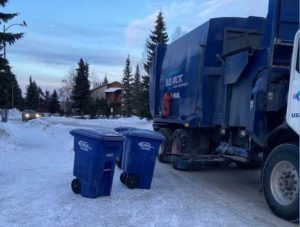
Washington, DC – U.S. Senators Lisa Murkowski and Dan Sullivan (both R-Alaska) welcomed the announcement of $22.4 million in in Solid Waste Infrastructure for Recycling (SWIFR) grants from the bipartisan infrastructure law for Alaska. This funding will support Alaska’s solid waste infrastructure for recycling, trash processing, and solid waste collection.
“The bipartisan infrastructure law continues to bring home significant investments that support Alaska’s infrastructure, and these awards to communities and Tribal governments will help us build out waste management and processing systems across the state. Trash, and our ability to deal with it—while not a glamorous issue—is critical to everyone,” said Senator Murkowski.“When I was working on the bipartisan infrastructure law, I listened to Alaskans and conveyed their needs—and waste and trash were issues in every community. These funds will result in better waste processing by investing in recycling and composting infrastructure, waste collection, and more.”
“I often say that Alaska is a resource rich, infrastructure poor state, and this extends to waste and trash management,” Senator Sullivan said.“These awards, authorized through my Save Our Seas 2.0 Act and funded through the bipartisan infrastructure bill, will invest in waste collection, recycling and composting for Alaskan communities and tribes. This multi-year program will build out efficient waste management programs and prevent pollution, helping ensure that our lands and waters are some of the most pristine in the world.”
Alaska communities and Tribal governments awarded SWIFR funding:
- Matanuska-Susitna Borough ($3,540,340): To develop a local sustainable materials management system with residential recycling and composting.
- Aleut Corporation ($1,500,000): To establish a solid waste collection and recycling program on Adak Island.
- Aleutian Pribilof Islands Association ($1,499,090): To develop a regional sustainable materials management plan to reduce landfilling and burning of solid waste.
- Cook Inlet Tribal Council ($1,500,000): To establish and expand materials management infrastructure to support plastics recycling, 3D printing, and other fabrication technologies in Alaska Native villages. For example, a community may wish to use recycled plastic to create toys for in-school use, while another may envision a use that supports local fishing operations or produces beads for traditional crafting activities.
- Native Village of Ekwok ($817,497): To expand solid waste recycling program activities and increase community participation with a new stand-alone Solid Waste Recycling program.
- Igiugig Village ($1,475,782): To build a new year-round Igiugig Village Recycling Center.
- Kawerak ($1,497,988): To develop a regional recycling center serving Nome and surrounding communities, diverting materials from 16 local, unlined landfills in rural and remote areas.
- Knik Tribe ($212,197): To establish green waste collection and composting systems on tribal land in coordination with the food bank, schools and partners.
- Kodiak Area Native Association ($1,338,254): To assist all six Kodiak village communities with rural waste stream inventories and improve waste management infrastructure for efficient management, waste reduction, and recycling.
- Metlakatla Indian Community ($555,707): To develop a community composting program with the MIC S’ndooyntgm Galts’ap Community Garden by building a composting facility and providing community education.
- Nelson Island Consortium ($1,500,000): To backhaul hazardous waste materials from each of the seven communities in the Consortium by building capacity through training and community engagement, purchasing shipping equipment and recycling sheds.
- Nenana Native Association ($973,500): To provide dumpsters and logistics support for local use and recycling, collection and transfer to the landfill in Fairbanks for recycling and proper disposal, and cleanup of illegal dump sites.
- Orutsararmiut Native Council ($1,372,833): To expand the Bethel Community Recycling Program with recycling accessibility, e-waste and hazardous waste backhaul, and establish a community composting program.
- Qawalangin Tribe of Unalaska ($1,186,753): To build a recycling hub and recycling program for the Aleutian Island chain, raise awareness on the recycling process, produce recycled end products, and educate on the use of these recycled products.
- Native Village of Shaktoolik ($1,413,014): To expand the local waste management system by purchasing five pieces of heavy equipment which will allow the community to relocate recyclables to a safe and easily accessible area to reduce contamination in the recycled materials stream.
- Central Council Tlingit & Haida Indian Tribes ($1,499,998): To expand the Tribe’s composting and food waste reduction program and bolster its recycling program while serving Southeast Alaska’s broader tribal network by establishing a regional solid waste management hub.
- Yakutat Tlingit Tribe ($559,548): To develop a community-wide composting program, create and share outreach and education materials with the community to help the program succeed in diverting food waste from the community landfill, and support the tribal greenhouse and community garden.
###
